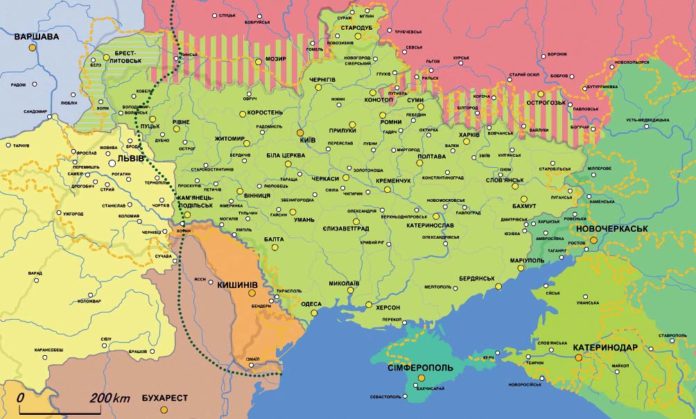2018 is rich in historic anniversaries, among which we mention the one hundredth anniversary of the conclusion of the so-called Brest Peace Treaty that became not only the first peace treaty during the Great World War, but also the uncontested success of young Ukrainian diplomacy and this fact should be noted separately.

Підписанти Берестейського мирного договору: генерал Брінкманн, Микола Любинський, Микола Левитський, Олександр Севрюк, Макс Гоффманн, Сергій Остапенко
The situation in the winter of 1918 was more than threatening for the young Ukrainian People’s Republic (UPR), which, after proclaiming its independence on January 22, 1918, turned into an object of direct armed aggression of Soviet Russia.
Despite the assertion of many contemporary historians and political scientists who criticize the main state body of the UPR – the Central Rada – for lack of attention to the development of its own armed forces, the young state still had been resisting rather actively.
However, there were not enough forces and the Central Rada adopted an agreement to conclude peace with the so-called Central States – Kaiser Germany, Austria-Hungary, the Ottoman Empire and Bulgaria. The Central States promised to provide military and armed assistance in exchange for foodstuff s.
The negotiations between the Central Rada of the UPR and the Central States were held in the city of Brest (now it is the territory of Belarus). The partners of Ukraine put forward one condition: the negotiations were possible only if Kyiv remained under control of the UPR.
This condition was adhered to by the Ukrainian government, albeit at a very costly price, namely the Battle of Kruty itself and a series of fights in the north-eastern direction aimed at detaining Russian-Bolshevik troops that were advancing at Kyiv, and gave the opportunity to sign a peace agreement with new allies.

Another problem at these negotiations was the presence of a delegation of Soviet Russia in Brest, headed by Leon Trotsky, who was then People’s Commissar (Minister) of Foreign Affairs and who at the beginning of the negotiations categorically refused to recognize not only the Ukrainian People’s Republic but also the presence of the Ukrainian delegation at the negotiations.
Only under the pressure of the Central States Trotsky agreed to «the right of nations to self-determination».
Despite Trotsky, one of the allies, namely the Minister for Foreign Affairs of Austria-Hungary, Count Ottokar Chernin also caused problems to the Ukrainian delegation. He, not without reason, feared that diplomatic recognition and signing of an agreement with a young Ukrainian republic could disturb the centripetal sentiment in the provinces of Austria-Hungary, which we now call Western Ukraine, and therefore had his demands to Ukrainian diplomats.
The Ukrainian delegation consisted of people, none of whom was a professional diplomat and had any prior experience of diplomatic work. Actually, the Head of the Ukrainian delegation was then the Prime Minister of Ukraine, Vsevolod Holubovych, son of a priest and engineer in the specialty. Other members of the Ukrainian delegation – Mykola Levytsky, Mykola Liubynsky, Mykhailo Poloz and Oleksandr Sevriuk – also did not have diplomatic education and were mostly professional revolutionaries, activists of the Ukrainian socialist parties.
However, they managed not only to ensure the pressure of the representatives of the Central States on Trotsky, not only to calm Count Chernin down, claiming that the UPR would not require more than the creation of a Ukrainian autonomy in Austrian province of Galicia, but also they managed to sign the Brest Peace Agreement, the consequences of which were for Ukraine more than favourable.

First of all, Ukraine was coming out of the World War. Secondly, Ukraine’s ethnic territories, Chelm Land and Pidlyashya, (which, by the way, are now part of Poland), belonged to Ukraine. Thirdly, and this was the most important, in the current situation, the troops of Germany and Austria-Hungary entered the territory of Ukraine and, together with the Ukrainian army, liberated the whole territory of Ukraine from the Bolsheviks.
In fact, a little known, newly-formed state, which did not have a fully functioning state apparatus (together with the diplomatic service), was able to impose its will on the superpowers of the world of that time, ensuring its own sovereignty and its own security, while successfully using the need of the Central States for foodstuff s. This peace not for nothing had been called in the German historiography as the Bread Peace.
Certainly, the further course of events turned out to be unfavourable and tragic for our state: Ukraine as an independent state disappeared from the political map of the world, but the perseverance, the patriotism, and the determination with which young Ukrainian politicians, not being professional diplomats, dared to defend national interests of their country in front of much more experienced political partners of the negotiations deserve admiration and appreciation from the descendants.













